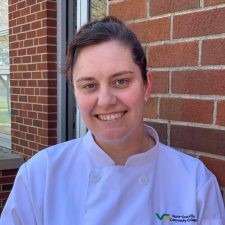This website uses cookies so that we can provide you with the best user experience possible. Cookie information is stored in your browser and performs functions such as recognising you when you return to our website and helping our team to understand which sections of the website you find most interesting and useful.
Early Childhood Education – Transfer Track
Program Description
The Early Childhood Mission Statement: The Early Childhood Program is committed to making quality education accessible, building creative learning environments, and developing more effective ways of providing quality learning experiences. Program faculty members work cooperatively with high schools, public and private child care homes and centers, four-year colleges, universities and other agencies in an effort to make higher education more accessible for students. The program is also committed to making culturally, linguistically, and ability diverse learning opportunities accessible to all students.
The Early Childhood Education curriculum prepares individuals to work with children from birth through eight in diverse learning environments. Students will combine learned theories with practice in actual settings with young children under the supervision of qualified teachers. Course work includes child growth and development; physical/nutritional needs of children; care and guidance of children; and communication skills with families and children. Students will foster the cognitive/language, physical/motor, social/emotional and creative development of young children.
Graduates are prepared to plan and implement developmentally appropriate programs in early childhood settings. Employment opportunities include child development and child care programs; preschools; public and private schools; recreational centers; Head Start Programs; and school- age programs.
| Program Name | Credit Hours | Program Type |
|---|---|---|
| Early Childhood Education – Transfer Track A.A.S. Degree (Course Sequence) | 74 Credits | |
| Early Childhood Education – Local Track A.A.S. Degree (Course Sequence) | 66 Credits | |
| Early Childhood Diploma (Course Sequence) | 38 Credits | |
| Early Childhood Administrative Assistant Certificate (Course Sequence) | 16 Credits | |
| Early Childhood General Education Certificate (Course Sequence) | 16 Credits | |
| Infant/Toddler Care (Course Sequence) | 16 Credits |
Program Details
Discover the specifics of our programs, including required courses, course sequence, pathways, and learning outcomes.
In Class Program Outcomes
- Early Childhood students will be able to create environments that are healthy, respectful, supportive, and challenging for all children.
- Early Childhood students will be able to design and implement developmentally effective curriculum that addresses all domains of learning.
- Early Childhood students will be able to support and empower all children, families, and communities through trusting and respectful reciprocal relationships.
- Early Childhood students will be able to use authentic assessment responsibly to make informed decisions to guide all children’s learning.
- Early Childhood students will be able to communicate effectively using standard written and verbal skills.
- Early Childhood students will be able to utilize technology to enhance learning for all children.
- Early Childhood students will serve as a leader, advocate, and professional in the field of early education.

“I have had an amazing time in this program! Made some friends, learned so much, and had some great experiences.”

